When was the last time you heard a great story read aloud? Do you even remember? If you don’t, or even if you do, there will be a gathering of talent at Mike N Molly’s on Sunday, July 27th, that should be sufficient to make you listen the hell up. Under the banner of the Pygmalion Literary Festival, the creative minds and mouths of Roxane Gay, Leesa Cross-Smith, Lindsey Gates-Markel, and Ruben Quesada will converge for your listening pleasure.
Of the four, Roxane Gay has made the most visible splash lately, with the publication of her thoroughly great debut novel, An Untamed State. In addition to the novel, Gay’s essay collection, Bad Feminist, will be available starting August 5th. She is the headliner here, with a Q&A to follow her reading.
The other three writers/readers on Sunday are heavy-hitters and local favorites in their own right. Leesa Cross-Smith, of Kentucky, is perhaps best known, lately, for her collection of stories entitled Every Kiss a War. Lindsey Gates-Markel, who has been publishing steadily on some big-time literary websites, is also a well-known actor in the C-U area, and her podcast You Big Dumb Idiot is quality ear candy. And poet Ruben Quesada, an assistant professor of English and Creative Writing for the Performing Arts at Eastern Illinois University, is a Pushcart Prize nominee who has founded such literary stages as Codex Journal and Stories & Queer.
I was thrilled to get in touch with all four of them for a pretty fascinating discussion. I began by posing some general questions to the group, then I followed up with some more specific questions based specifically on their work. (For the record, Mr. Quesada was suffering from some kind of horrendous bug at the time, so he and I didn’t speak at length. It was surely my loss—and yours, dear readers.)
Here’s how the conversation(s) went.
———
Questions for all:
Smile Politely: What is the first thing that you remember sparking your interest in writing? Not just something you liked reading, but something that made you think about writing something of your own.
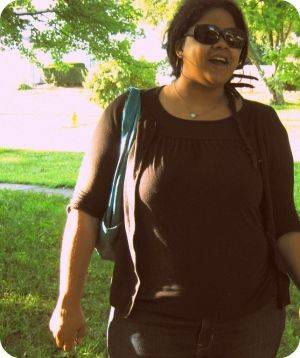 Leesa Cross-Smith (pictured, left, in a shot from her website): TV shows and movies! I used to videotape shows like Full House and Growing Pains and write out the scripts, character by character, and memorize the lines. I used to watch stuff like Pretty in Pink and quote the dialogue and memorize things. I loved thinking about one person or a group of people writing these things, coming up with these characters and crazy and/or romantic situations.
Leesa Cross-Smith (pictured, left, in a shot from her website): TV shows and movies! I used to videotape shows like Full House and Growing Pains and write out the scripts, character by character, and memorize the lines. I used to watch stuff like Pretty in Pink and quote the dialogue and memorize things. I loved thinking about one person or a group of people writing these things, coming up with these characters and crazy and/or romantic situations.
Lindsey Gates-Markel: I was writing stories before I can remember wanting to write stories. My dad transcribed them on our word processor, and they were always about two animals being friends and then making friends with other animals. But I remember being 10 or 11 or so and reading about a girl my age who had won a contest and had a book published that she’d written and illustrated. I obsessed over the article and immediately began writing long stories, complete with overlong character descriptions and poor illustrations. I still have my first (and only) novel, about a girl who reunites with her childhood girlfriend as a teenager only to find out that her friend has GONE BLIND in the meantime. Heavy. And proof that I’ve been writing about girl friendships since time immemorial (or 1995).
Roxane Gay: My parents read to me as a child and hearing those wonderful stories made me want to tell wonderful stories. I wouldn’t have articulated it like that back then but I wanted to write the kinds of words that might be found in books.
Ruben Quesada: I remember publishing a poem anonymously in my high school paper during my freshman year and it caused quite a stir. I knew then that there was power in my writing. It was exciting. I continued writing and in my senior I won a high school writing competition sponsored by the Los Angeles Times. And it was that moment that I knew writing was all I wanted to do for a living.
SP: What shuts you down? Are there things you avoid, when writing?
Cross-Smith: I don’t like to dwell on the dark, dark stuff. Everyone experiences stuff like that to varying degrees, but I try not to let myself sit there for too long, because what’s the point? I try to stay as positive as possible, even when it’s hard. I try to tell all sides of the story, but I also want people to be able to read my writing and drift away if/when they can. I like to keep it light.
Gates-Markel: Procrastination, fear, anxiety — myself more than any outside influence.
Gay: I’m not sure what shuts me down — cruelty, probably, but then, as the song goes, I get back up again. When I’m writing, I’m always avoiding the easy story. The easy stories have already been told.
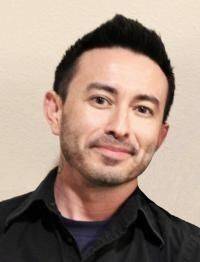 Quesada (pictured, right, in a shot from the EIU site): Nothing shuts me down. Art and poetry are meant to push boundaries and discuss issues in the community that might be uncomfortable or that people might not want to discuss. The goal of my poetry is to cause conversation about race, queerness, death, and other big issues.
Quesada (pictured, right, in a shot from the EIU site): Nothing shuts me down. Art and poetry are meant to push boundaries and discuss issues in the community that might be uncomfortable or that people might not want to discuss. The goal of my poetry is to cause conversation about race, queerness, death, and other big issues.
SP: If you are writing, what else is happening? Do you like quiet? Do you have a soundtrack?
Cross-Smith: Usually when I’m writing, I’m listening to my children do something else. They’re either chatting or playing a game or running around or slamming the back door. When I am lucky enough to get some quiet-quiet time, I love it. I’ll even put in earplugs so I can drown out whatever super-loud machine my neighbors turn on out in the yard. Sometimes I do listen to music, but it depends. I do like to listen to soundtracks and Lana Del Rey and classic rock and hippie music when I write.
Gates-Markel: I’d be lying if I said I had a process. I like white noise and quiet and time and daydreaming. I like to get up about an hour earlier than necessary in the mornings to write with coffee and my cat in my little upstairs office. I just figure it out as I go.
Gay: I generally write while listening to music or television. I can write under most any circumstance so I don’t have a super particular set of needs beyond my laptop and a comfortable place to sit.
Quesada: Depends. Sometimes I like it to be completely quiet. Other times I might be listening to music (Beyonce, Mariah, and Whitney have been on the soundtrack most recently). When I’m revising and at home, I might have a movie playing in the background. It has to be something I’ve watched many times, so that I can watch a little bit of it when I need a break. Usually I play Pretty Woman or Working Girl—two classics that don’t need much attention.
SP: Excluding the company of writers you know, whose work do you most enjoy reading?
Cross-Smith: I enjoy Diana Gabaldon, Jack Kerouac, Lorrie Moore, Mary Gaitskill, Miranda July, Erica Jong, Alicia Erian, Tim O’Brien and and and.
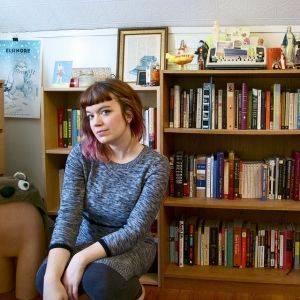 Gates-Markel (pictured, left, in a shot from her blog): Right now I’d have to say Aimee Bender (she responded, self-consciously). I’m somehow just getting around to reading her latest short story collection, and I’m so obsessed with her. I love fabulism. I’ve also been an Anne Lamott devotee for years. And, listen, not to suck up, but I’m about 3/4 of the way through An Untamed State right now and, though I’ve loved Roxane’s writing for a few years now, I’m like OH. I’ve been reading and hearing all this talk about the novel and, you know, I get it now.
Gates-Markel (pictured, left, in a shot from her blog): Right now I’d have to say Aimee Bender (she responded, self-consciously). I’m somehow just getting around to reading her latest short story collection, and I’m so obsessed with her. I love fabulism. I’ve also been an Anne Lamott devotee for years. And, listen, not to suck up, but I’m about 3/4 of the way through An Untamed State right now and, though I’ve loved Roxane’s writing for a few years now, I’m like OH. I’ve been reading and hearing all this talk about the novel and, you know, I get it now.
Gay: It is difficult to exclude the writers I know because I know a lot of writers but right now I am really enjoying Edith Wharton, Michael Chabon, Chimamanda Ngozi Adichie, Eduardo Corral, Stacia Brown, and Leslie Jamison.
Quesada: I like reading the work of those I know, but I don’t spend too much time with them because the best type of writing comes from distance to our time. I enjoy reading Ovid, Gabriela Mistral, Thomas Hardy, and W.H. Auden, to name a few.
SP: Writing something for others to absorb on their own and reading it aloud to them are two very different transactions. Does the text change for you when you present it to an audience yourself?
Cross-Smith: Agreed. The text does change for me a little because the reader/people are visible… right in front of my face. I always think about the reader when I’m writing, but reading my work in front of actual people lifts the whole thing a little more. I’m always pleasantly surprised when people laugh where I’ve imagined them laughing. That’s nice.
Gates-Markel: I LOVE DOING READINGS. Reading aloud is magical. I used to make cassette tapes of myself reading my favorite books out loud as a kid, and I’m forever advising my stepson that he read his school papers out loud. You just learn more about a work that way — whether you discover who the narrator really is and/or what the story is really about and how it feels or whether you discover that you mixed a metaphor or used the same word (perhaps “purr”) three times in one damn paragraph. You’re still telling someone else’s story, but when you tell it aloud, you’re hearing it, too—in more than just a physical sense.
Gay: There’s definitely something that happens when I’m reading work aloud to an audience, there’s a different kind of seduction to pull them in and hold them close and so I try to keep that in mind.
Quesada: I like to write poetry that is best read and poetry that is best performed. So yes, of course, the text is always changing to suit a live audience. I think it’s fundamental to think that way—consider your audience. The idea is thousands of years old.
SP: Name three things that are sublime.
Cross-Smith: The smell of woodsmoke; having one whole day to myself where I don’t have to talk to anyone/do anything/be responsible to anyone other than myself and my God; swimming, floating in the ocean.
Gates-Markel: Watching people sing in musicals. Malt vinegar on my fries. The Book Thief.
Gay: Los Angeles, words, cherries.
Quesada: The Internet, Space Travel, Quantum Particles.
———
More with Leesa Cross-Smith
SP: I’ve been reading your story “Whiskey and Ribbons,” and I’m honestly a little woozy from it. “We sound like a sad country song that hasn’t been written yet. We go to bed at night in deep darkness and wake to these thin-as-a-communion-wafer mornings with their dirty white winter sunlight and hush.”
That is some beautiful imagery, and it’s incredibly evocative. The thinness, the brittleness of winter mornings… That’s good stuff. And the weather mirrors so closely Evangeline’s emotional state. Do you find that nature represents the one who sees it?
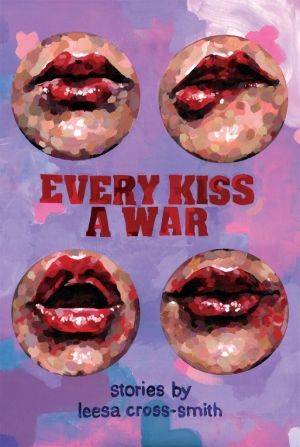 Cross-Smith: Thank you so much for your kindness and for reading! Regarding nature I think, for sure sometimes! It’s interesting for you to say it that way and I have to agree. On a thin, brittle winter morning when I feel like everything could just crack and disappear, I notice that coldness a lot more. And on perfect summer mornings and nights, I definitely can feel both the infiniteness and smallness of my spirit and life. Depending on my mood.
Cross-Smith: Thank you so much for your kindness and for reading! Regarding nature I think, for sure sometimes! It’s interesting for you to say it that way and I have to agree. On a thin, brittle winter morning when I feel like everything could just crack and disappear, I notice that coldness a lot more. And on perfect summer mornings and nights, I definitely can feel both the infiniteness and smallness of my spirit and life. Depending on my mood.
SP: “I reach my hand straight out to wave to him and say “Hey, Baby,” and he makes the happiest squealing baby sound that echoes off of everything in the kitchen. That echoes off of everything inside of me and then shoots straight up to Heaven to Eamon’s waiting ears. I have to believe it does.”
This is a lovely description for anybody to read, but for somebody with children, it’s quite powerful. Added to which, it corresponds with a parent’s need to occasionally be alone, even if it lets in guilt. Does being a parent ever come into conflict with being a writer, for you?
Cross-Smith: I do require a goodly amount of alone time. I’ve been a mom for ten + years and I still feel guilty about needing that time alone, but my husband is very good about recognizing when I’ve gone too long, and he will remind me and take the kiddos out for slushies or to the park. I’m a homemaker/stay-home mom, so finding time to write is pretty much impossible when my kids are out of school for the summer; but when they’re in school, I can structure my writing days. It was an adjustment for me to get used to being around other people 24/7 when I became a mom. Especially when I was nursing my babies…the realization that I just never got ANY TIME alone. I used to have my daughter strapped to me all of the time and she wouldn’t drink from a bottle so I couldn’t even leave her with my husband there for a little while. I love being with my family and I love them madly, but Mama still needs alone-time and me-time, and I’m slowly getting better about recognizing that before it’s too late. When it gets too late, I get fussy about it.
SP: “We’re taped together with the love that we have for each other and for Eamon and for Noah and yes, it’s a crooked life. It’s at once rickety and ramshackle and brand-new, but it’s something, even when I don’t know what. I know I’m loved.”
This passage, the constant mention of what people are wearing. The notice of how people stand, the routines… There are all kinds of intimacy. This story has a deep well of longing in it.
Cross-Smith: Thank you so much for this! That was exactly what I was going for…I wanted the reader to read and feel and know how intimate Dalton and Evangeline had been together, although they had never kissed or been intimate in that way… they knew so much about one another and had spent their mornings and nights together. They’d wept together and made dinners together and been up in the middle of the night with a fussing baby together. I wanted Evangeline to be surrounded with all of these comforting things, all of this love… to keep her afloat. And there are times when she still finds herself sinking, but she isn’t alone. “Deep well of longing” is a really beautiful way for you to put it. Thank you. I believe we, as humans, all have a deep well of longing! In one way or another, for one thing or another. Yes.
SP: One last thing. Can you expand a little on this phrase from the story? “People both do and don’t disappear.”
Cross-Smith: When I wrote that I was really trying to dig into Evangeline’s grief as a widow…and her new responsibilities as a mother. Eamon was killed. Her husband was gone, the father of her baby was gone, so how was he still everywhere? She sees him in her baby’s face and can still hear his voice in her head, so he’s still there. But where is he? So when she first gets the news that he is killed, she keeps asking where is he? Where is he? Because she wants to know where his body is. She’d never see him alive again. He was buried and “disappeared” … but she still feels him. So he’s still there. He both did and didn’t disappear. That legacy, that life, those feelings, his gestures and his eyes and his smile, she can see those reflected in their son…he didn’t disappear completely, but he’s left this world. There’s an aching there that never quite goes away when someone is grieving. It’s fullness and emptiness at the same time and I wanted to respect that and (attempt to) speak from both sides…all sides of those feelings.
———
More with Lindsey Gates-Markel
SP: So… I went though the links on your site to the various published stories (and a few non-fic pieces, of course), and… Jesus. The longing in these short, short stories. The want. The things not said. The way people Aren’t Doing Things.
“She was sitting on the front cement steps, not crying.” (“But Nobody Did”)
“I need our baby for my grandma, I don’t say.” (“Bring It On Home To Me”)
The understanding, as you don’t do or say something, that you’re not doing or saying it.
Since you’re probably not hearing a question in there, let me state it. You like to point out what people aren’t doing. Is that as important to you, as a writer? It’s a lovely, authentic, probing way to deepen your characters. (There’s still only a half-formed question there, so feel free to go wherever you want with it.)
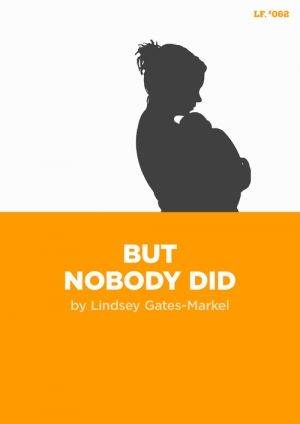 Gates-Markel: The longing is all autobiographical in the same way that fiction is. Writing has always functioned as the best way for me to process and understand living, and personally, I’m forever still getting over the teenage feeling of wanting to live a hundred thousand lives. I’m greedy. I’m full of longing. I’ve also spent too much time hoping to gain the hard-won approval of various men. It follows that I write girls and women who concentrate on being “good” and calm and not hysterical. My girls leave the most important things unsaid and they promise themselves things that they may never ask for. The way out of that, for them (and me), is often best friendships and the love and encouragement of other girls and women. In “But Nobody Did,” Edith mentioning that Rosalie isn’t crying when she sees her implies that as she was riding her bike to Rosalie’s, she’d been thinking of her, putting herself in Rosalie’s place, and imagined she would be crying. That’s how my best friendships with women work. It’s more of a soulmate situation. You understand one another deeply. My best friend has a toddler, and once during her pregnancy, she called me at 2am and asked me to take her to the emergency room because she was horribly sick. But when I saw how sick she was, I had to call my husband to drive us, because seeing her that sick made me sick, too. I just crumpled when I saw her. So it’s important for me to tell the truth of my female experience, in all its muck and glory.
Gates-Markel: The longing is all autobiographical in the same way that fiction is. Writing has always functioned as the best way for me to process and understand living, and personally, I’m forever still getting over the teenage feeling of wanting to live a hundred thousand lives. I’m greedy. I’m full of longing. I’ve also spent too much time hoping to gain the hard-won approval of various men. It follows that I write girls and women who concentrate on being “good” and calm and not hysterical. My girls leave the most important things unsaid and they promise themselves things that they may never ask for. The way out of that, for them (and me), is often best friendships and the love and encouragement of other girls and women. In “But Nobody Did,” Edith mentioning that Rosalie isn’t crying when she sees her implies that as she was riding her bike to Rosalie’s, she’d been thinking of her, putting herself in Rosalie’s place, and imagined she would be crying. That’s how my best friendships with women work. It’s more of a soulmate situation. You understand one another deeply. My best friend has a toddler, and once during her pregnancy, she called me at 2am and asked me to take her to the emergency room because she was horribly sick. But when I saw how sick she was, I had to call my husband to drive us, because seeing her that sick made me sick, too. I just crumpled when I saw her. So it’s important for me to tell the truth of my female experience, in all its muck and glory.
SP: You like the word “purr.” As well you should. I don’t mean to James Lipton here, but do you have a favorite word? And do you find so many uses for “purr” in your work because you are, after all, a cat lady?
Gates-Markel: The purring! It’s not just “purr.” I haven’t done the math, but I know cats appear in my stories at least 90% of the time. They’re all over the place. They’re little totems. I have to tell the truth of my cat experience, too. As in life, they tend to wander through the room just when we need to project our human emotions onto them, and they represent both a companion and a wild thing.
I don’t do favorite words or favorite colors or favorite foods or anything like that. I love them all. Gimme.
SP: With the writing, the acting, the directing (I assume soon), the music, and the podcasting, are you getting in the sprinter’s blocks to begin your eventual takeover of all media? (I think once you secure a gig with the greeting card industry, you’ve got a lock.)
Gates-Markel: Next in my sights is writing and acting in a short film. I’m on it. All over it. Up and down and sideways it.
———
More with Roxane Gay
SP: I’ve already said quite a lot about An Untamed State in my review, so I won’t rehash my admiration of it except to say that I’m glad to see that it has received so many positive notices. (The shout-out from The AV Club was particularly sweet.) Did you anticipate, when you wrote it, that it was going to be received so well?
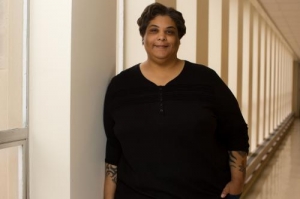 Gay (pictured, right, in a shot from her book jacket and website): I did not anticipate that it was going to be received so well. It took a bit of time to sell and it’s a dark subject matter. I wasn’t sure if people would see what I was trying to do with the book. It has been gratifying and the most unexpected pleasure to see the book do so well particularly because I was able to write exactly the book I wanted to write. I take none of it for granted.
Gay (pictured, right, in a shot from her book jacket and website): I did not anticipate that it was going to be received so well. It took a bit of time to sell and it’s a dark subject matter. I wasn’t sure if people would see what I was trying to do with the book. It has been gratifying and the most unexpected pleasure to see the book do so well particularly because I was able to write exactly the book I wanted to write. I take none of it for granted.
SP: I have recommended An Untamed State to a lot of people, and everyone who has taken my recommendation has come away from it shaken and grateful. You’ll never meet these people, most likely. You’ll never meet most of the people who hear about you now, who know your name. That’s the way of things with a life of letters, I suppose.
I would ask how much time you’re going to allow yourself to enjoy this moment before you get back to writing, but I know you already have another book ready to be released. And I know from your Tumblr posts that you find time to write even in the midst of all the activity surrounding you now. Are you looking forward to having a larger platform from which to share your work?
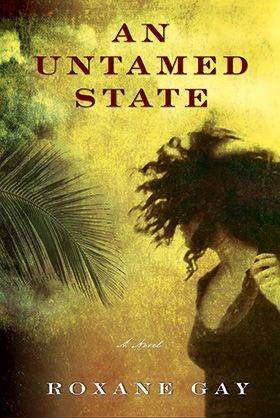 Gay: A larger platform, more readers is wonderful and flattering. It’s also intimidating. I generally tell myself no one is reading my writing so I can have the courage to put myself out there. It is becoming increasingly difficult to do that which is taking some getting used to.
Gay: A larger platform, more readers is wonderful and flattering. It’s also intimidating. I generally tell myself no one is reading my writing so I can have the courage to put myself out there. It is becoming increasingly difficult to do that which is taking some getting used to.
SP: I won’t ask what you’re working on now or next, but I’m curious: Do you have another novel in mind?
Gay: I do have another novel in mind–I’m not sure on the title yet but it’s about a woman and the child she has for her sister-in-law via surrogacy who is also her biological daughter and the lengths she will go to to get her child back.
SP: One last question: How important to your process is Channing Tatum’s neck?
Gay: Channing Tatum’s neck is everything.
———
As a parting gift, of sorts, I gave each of the writers a chance to ask a question of their fellow writers. Interestingly enough, everyone seemed to have a question for Ruben Quesada, and Quesada had a question to be addressed to everyone else.
Leesa Cross-Smith to Ruben Quesada: Please describe your perfect day.
Quesada: “I’d have to say, April 25th because it’s not too hot and not too cold and all you need is a light jacket.”
Lindsey Gates-Markel to Ruben Quesada: What did you imagine would be true about being a poet that is not at all true about being a poet?
Quesada: I imagined that because I was a poet and creative that I would always be a poet and creative. I had no idea how hard it would be to be creative on demand or all of the time.
Roxane Gay to Ruben Quesada: How do you want to change the landscape with your poetry?
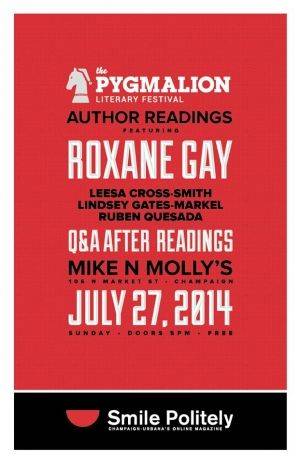 Quesada: I want my poetry to challenge American poetic notions about the landscape of Latino poetry. Latino poetry in America has traditionally implicated class, gender, and it has been steeped in cultural ideologies. These ideologies are what some of my contemporaries like to call Abuela and Tortilla poems. A recent anthology, Angels of the Americlypse: New Latin@ Writing, edited by Carmen Giménez Smith and John Chávez, provides a diverse collection of Latin@ poets who are challenging these traditional notions. I’d like my poetry to do the same. Often, I write from a philosophical perspective, which has rarely been seen from Latin@ poets. There is a long standing tradition of philosophical poetry from white writers like Mary Oliver, Wallace Stevens, Robert Creeley, James Wright, and Marianne Moore. So, in a way I want to challenge the landscape of Latino poetry by finding a place for myself within an existing landscape.
Quesada: I want my poetry to challenge American poetic notions about the landscape of Latino poetry. Latino poetry in America has traditionally implicated class, gender, and it has been steeped in cultural ideologies. These ideologies are what some of my contemporaries like to call Abuela and Tortilla poems. A recent anthology, Angels of the Americlypse: New Latin@ Writing, edited by Carmen Giménez Smith and John Chávez, provides a diverse collection of Latin@ poets who are challenging these traditional notions. I’d like my poetry to do the same. Often, I write from a philosophical perspective, which has rarely been seen from Latin@ poets. There is a long standing tradition of philosophical poetry from white writers like Mary Oliver, Wallace Stevens, Robert Creeley, James Wright, and Marianne Moore. So, in a way I want to challenge the landscape of Latino poetry by finding a place for myself within an existing landscape.
Ruben Quesada to everyone else: If you could change something about society, what would you change?
Cross-Smith: I believe everyone could stand to be a lot quieter, a lot kinder, a lot more generous, a lot more empathetic, a lot more forgiving. Lovelovelove more, always. And more vacations and slushies, please. Lots.
Gay: I would love to see what our society might look like if mankind rid itself of bloodthirst.
———
The Pygmalion Literary Festival event — featuring Roxane Gay, Leesa Cross-Smith, Lindsey Gates-Markel, and Ruben Quesada — will open its doors at 5 p.m.








